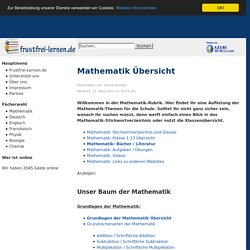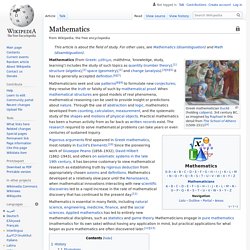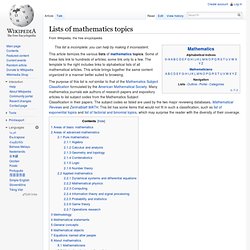

Areas of Advanced Mathematics. Mathematik Übersicht. Willkommen in der Mathematik-Rubrik.

Hier findet ihr eine Auflistung der Mathematik-Themen für die Schule. Solltet ihr nicht ganz sicher sein, wonach Ihr suchen müsst, dann werft einfach einen Blick in das Mathematik-Stichwortverzeichnis oder nutzt die Klassenübersicht. Anzeigen: Grundlagen der Mathematik: Weitere Artikel: Mengen und Elemente, Zahlenarten, Rechnen mit Kommazahlen, Negative Zahlen, Punkt vor Strich / Klammern, Größer, Kleiner, Gleich, Primzahlen, Teiler und Vielfache, Mathematische Zeichen, Rechenmauer, Rechentabelle / Rechentafel, Rechendreieck, Rechnen mit Geld, Uhr lesen, Zeitspanne, Komplexe Zahlen Bruchrechnung: Bruchrechnung Übersicht ( alle Artikel ) Weitere Artikel: Bruchrechnung Grundlagen, Brüche addieren, Brüche subtrahieren, Brücke multiplizieren, Brüche dividieren, Brüche kürzen, Kehrwert, Hauptnenner, Bruchzahlen Zahlen / Einfaches Rechnen:
Mathematics Links Quantum Encryption and Black Holes. A proposed mathematical proof that outlines the way information behaves in coded messages may have implications for black holes.

The proof suggests that the radiation spit out by black holes may retain information on the dark behemoths. The research focuses on encoding communications in quantum mechanical systems. But it also connects to a long-standing question for physicists: What happens to all the stuff that falls into a black hole, and is it possible to retrieve any information about the black hole? A group of researchers from Switzerland and Canada, led by Frédéric Dupuis, showed that it's possible to encode large messages with relatively small quantum encryption keys, which are keys made up of subatomic particles or photons.
But the result implies something else: If someone could pull out information that is encrypted quantum mechanically in a message between two parties, the same feat should work in nature. Coding with particles Decoding black holes. Mathematics. Field of study Mathematics (from Greek: μάθημα, máthēma, 'knowledge, study, learning') includes the study of such topics as quantity (number theory),[1] structure (algebra),[2] space (geometry),[1] and change (analysis).[3][4][5] It has no generally accepted definition.[6][7] Rigorous arguments first appeared in Greek mathematics, most notably in Euclid's Elements.[10] Since the pioneering work of Giuseppe Peano (1858–1932), David Hilbert (1862–1943), and others on axiomatic systems in the late 19th century, it has become customary to view mathematical research as establishing truth by rigorous deduction from appropriately chosen axioms and definitions.

Mathematics developed at a relatively slow pace until the Renaissance, when mathematical innovations interacting with new scientific discoveries led to a rapid increase in the rate of mathematical discovery that has continued to the present day. History The Babylonian mathematical tablet Plimpton 322, dated to 1800 BC. Etymology ). Lists of mathematics topics. This list is incomplete; you can help by making it inconsistent.

This article itemizes the various lists of mathematics topics. Some of these lists link to hundreds of articles; some link only to a few. The template to the right includes links to alphabetical lists of all mathematical articles. This article brings together the same content organized in a manner better suited to browsing. The purpose of this list is not similar to that of the Mathematics Subject Classification formulated by the American Mathematical Society.
Areas of basic mathematics[edit] These lists include topics typically taught in secondary education or in the first year of university. Areas of advanced mathematics[edit] See also Areas of mathematics. As a rough guide this list is divided into pure and applied sections although in reality these branches are overlapping and intertwined. Pure mathematics[edit] Algebra[edit] Calculus and analysis[edit] Geometry and topology[edit] Combinatorics[edit] Logic[edit]